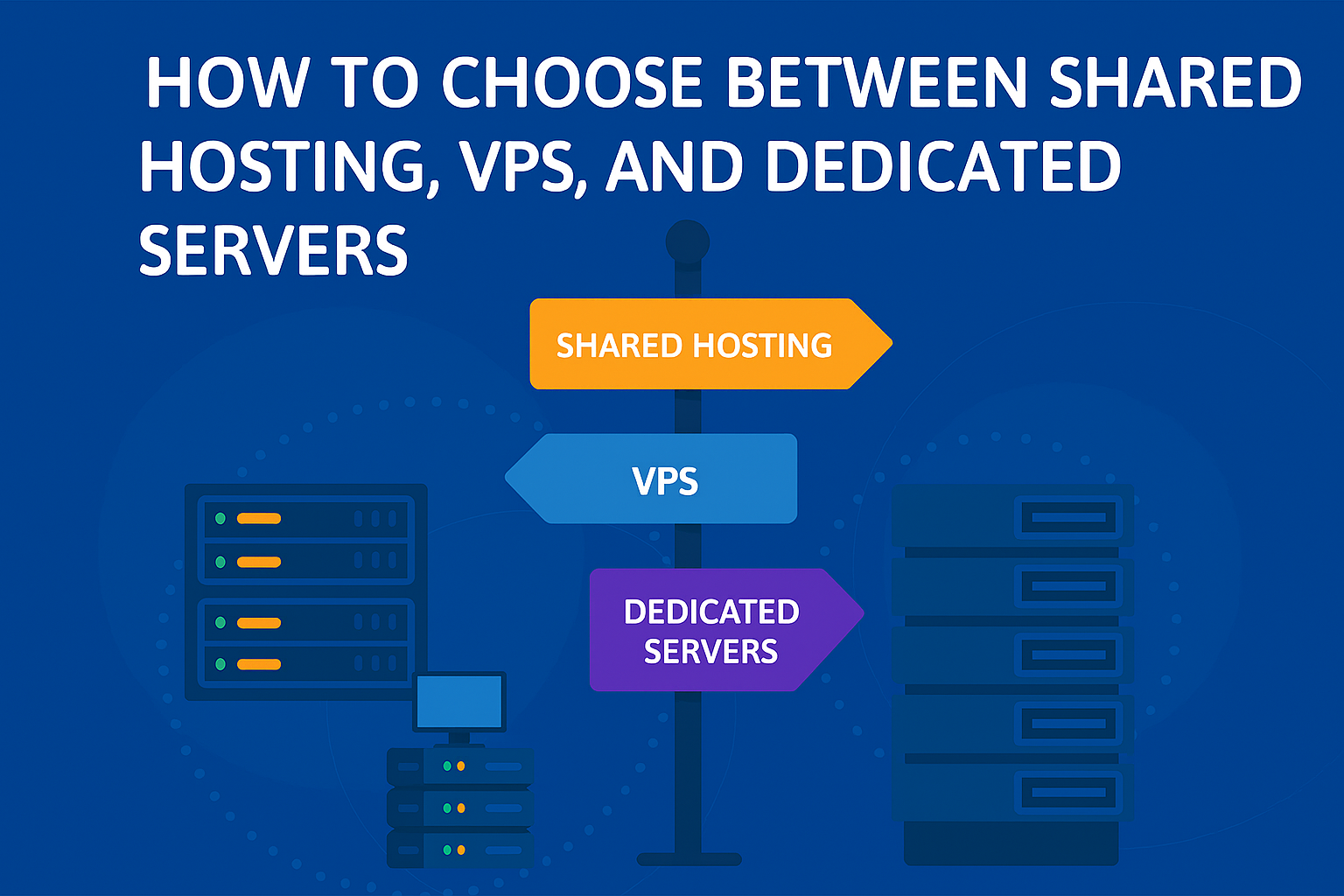How to Choose Between Shared Hosting, VPS, and Dedicated Servers
Choosing the right hosting solution is one of the most important decisions for any website owner. With so many options available, it can be overwhelming to decide which one will serve your business best. The three most popular hosting types are shared hosting, VPS hosting, and dedicated servers. Each comes with its own advantages, limitations, and ideal use cases. In this guide, we’ll break down the key differences and help you understand how to choose between shared hosting, VPS, and dedicated servers for your website.
What is Shared Hosting?
Shared hosting is the most common and budget-friendly option. In this setup, multiple websites share the same server resources such as CPU, memory, and bandwidth. This makes it an affordable choice, especially for beginners or small websites.
Pros of Shared Hosting:
-
Cost-effective and beginner-friendly
-
Easy setup with minimal technical knowledge required
-
Includes features like cPanel, one-click installations, and email hosting
Cons of Shared Hosting:
-
Limited resources due to sharing
-
Performance can slow down if other sites consume excessive bandwidth
-
Limited scalability and customization options
Best For: Small blogs, personal websites, or startups with low traffic needs.
What is VPS Hosting?
A Virtual Private Server (VPS) provides a middle ground between shared hosting and dedicated servers. Although multiple users share the same physical server, each VPS is partitioned with its own dedicated resources. This means better performance, stability, and flexibility compared to shared hosting.
Pros of VPS Hosting:
-
Dedicated resources for better speed and reliability
-
Greater control with root access
-
Scalable as your website grows
-
Improved security compared to shared hosting
Cons of VPS Hosting:
-
More expensive than shared hosting
-
Requires some technical knowledge for server management
Best For: Growing businesses, eCommerce sites, and websites expecting moderate traffic.
What is a Dedicated Server?
A dedicated server is a hosting solution where the entire server is reserved for one website. It provides maximum control, customization, and performance, making it ideal for high-traffic and resource-heavy websites.
Pros of Dedicated Servers:
-
Full access to all server resources
-
High performance, speed, and reliability
-
Maximum security and customization options
-
Ideal for handling large volumes of traffic
Cons of Dedicated Servers:
-
Higher cost compared to other options
-
Requires advanced technical knowledge or a dedicated IT team
Best For: Large enterprises, resource-intensive applications, or websites with millions of visitors.
How to Choose the Right Hosting Option
When deciding between shared hosting, VPS, and dedicated servers, consider the following factors:
-
Budget: Shared hosting is the most affordable, while dedicated servers are the most expensive. VPS sits in between.
-
Traffic Needs: Low-traffic sites can thrive on shared hosting. Medium-traffic sites should consider VPS, while high-traffic sites need dedicated servers.
-
Technical Skills: Beginners will find shared hosting easier, whereas VPS and dedicated servers require technical expertise.
-
Scalability: If you anticipate growth, VPS hosting provides flexibility without the high costs of a dedicated server.
Conclusion
Choosing the right hosting type ultimately depends on your business goals, website size, and budget. If you’re just starting, shared hosting is a cost-effective solution. For growing businesses, VPS hosting offers scalability and reliability. If performance and control are your top priorities, a dedicated server is the best option. By carefully weighing your needs, you can confidently decide how to choose between shared hosting, VPS, and dedicated servers for long-term success.






